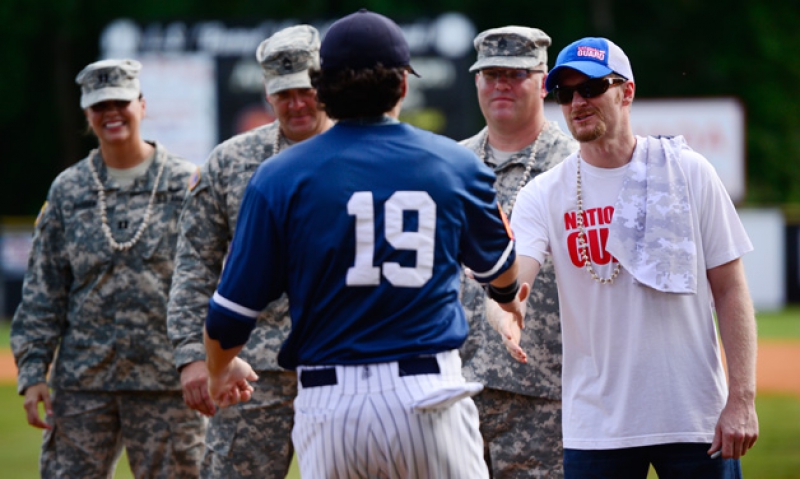
Dale Earnhardt, Jr. stopped by the Legion World Series to visit players, fans and National Guard members.
A day after his NASCAR race at Michigan Speedway, famed stock car driver Dale Earnhardt, Jr. made a pit stop at The American Legion World Series in Shelby, N.C., to visit players and fans.
Earnhardt walked on to the field at Keeter Stadium late Monday afternoon before the first pitch was thrown for Game 12, which pitted Waipahu, Hawaii, against Gonzales, La. He received an official ALWS jersey from National Americanism Commission Chairman Joseph Caouette, shook hands with each of the players, signed autographs and received a necklace of sea shells from the Hawaii team.
The 2013 competition season marks Earnhardt’s 14th in the NASCAR Sprint Cup Series, and the North Carolina native is popular among race fans. For each of the past 10 years, Earnhardt has received NASCAR’s Most Popular Driver Award for the Sprint Cup Series. His popularity has earned him a spotlight on magazine covers, television shows, music videos and major motion pictures. But he turns the spotlight away from him when it comes to U.S. troops.
Since the National Guard became a co-sponsor of Earnhardt’s No. 88 car six seasons ago and opened the door for Earnhardt to build a relationship with the troops, he has been visiting Walter Reed Medical Center and many military bases.
The American Legion spoke with Earnhardt about his relationship with servicemembers.
Q: Do you get to visit with servicemembers often due to your connection with the National Guard?
A: I get to interact with troops in a wide variety of ways. They come out to the track for appearances, and it’s a lot of fun. That’s really the meat and potatoes of our relationship so to speak — when we get a chance to be one on one with the soldiers, and we get an understanding of their commitment, what it’s about, what it entails and why they made that sacrifice. For me, visiting with soldiers is really fulfilling. It makes the sponsorship with the National Guard worthwhile, and it’s something I take a lot of pride in.
Q: What impact does your visits to Walter Reed have on you?
A: It’s an emotional tug of war when you go (to Walter Reed Medical Center), but being able to have a moment to listen to the soldiers that are there getting care, to give them an opportunity to share their stories with you about sports or whatever they want to talk about, to give their mind a break from what they are dealing with at the time is really what it’s all about, and it’s something that I enjoy doing. You see a lot of soldier’s in a lot of pain going through some very difficult situations, both physically and mentally. But you also see a great support system and amazing staff truly dedicated to giving each individual the best quality of life going forward and that’s a good feeling.
Q: What questions do you like to ask the servicemembers?
A: Really, they ask most of the questions. Sometimes they want to reflect back on their military experience, or they may be a big follower of our sport and want to ask in-depth questions. Or they don’t know anything about NASCAR and want to know what it’s like driving a car at 200 mph.
Q: Do you have a memorable moment with servicemembers?
A: I have a buddy who was in the military and was at Walter Reed needing some care, and I was able to visit him often. Having a real connection with an individual that was there and being a support system for him meant a lot to me. Every time I think about Walter Reed I think about him.
He lives in North Carolina now, leading a pretty good life because of the great care that he received at Walter Reed. It makes me feel good knowing that all those guys that I met there have received or are receiving that same opportunity.
Q: What lessons have you learned over the years to perfect your profession as a race car driver?
A: The one thing that makes you better is dedication. When I first started racing I thought that the driving was everything and all I had to do was worry about getting in the car and doing that as best I could. I never really understood how I could improve or assist outside of the car until I got older. Then I understood that constant contact and discussion with my crew chief was important. And once I got out of the car I wanted to take a day off or take time off until the next time I had to get in the car. I felt like that was my only responsibility when it’s really not. What you do off the field versus on the field is just as important to prepare for an event and that’s what took me a while to understand.
- Baseball

